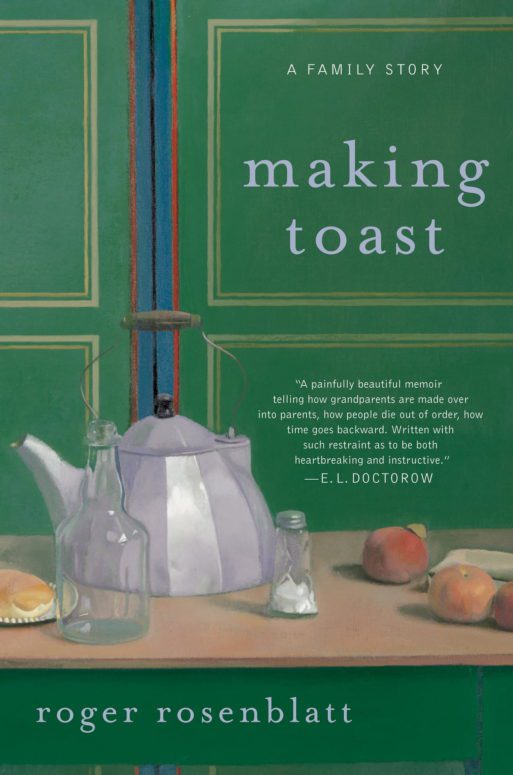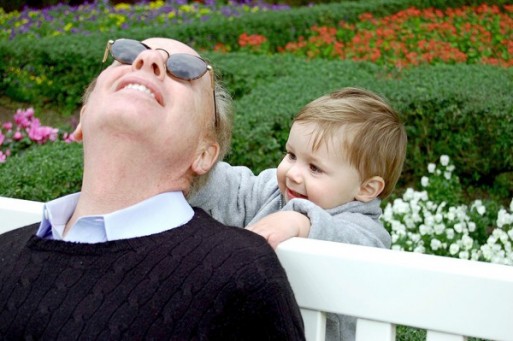 In his 2010 memoir, Making Toast, Roger Rosenblatt paints a beautiful portrait of what it means to lose someone too soon. After his daughter, Amy, dies suddenly of a rare heart abnormality, Rosenblatt and his wife move in with their son-in-law to help raise the children she left behind. Through brief vignettes of his day-to-day life in the aftermath of Amy’s death, we see him rediscover the ins and outs of parenting while coping with the loss of his only daughter. With the natural order turned around, Rosenblatt details his struggle with losing a child and having to comfort grandchildren who have lost their mother.
In his 2010 memoir, Making Toast, Roger Rosenblatt paints a beautiful portrait of what it means to lose someone too soon. After his daughter, Amy, dies suddenly of a rare heart abnormality, Rosenblatt and his wife move in with their son-in-law to help raise the children she left behind. Through brief vignettes of his day-to-day life in the aftermath of Amy’s death, we see him rediscover the ins and outs of parenting while coping with the loss of his only daughter. With the natural order turned around, Rosenblatt details his struggle with losing a child and having to comfort grandchildren who have lost their mother.
There are so many touching moments in this piece it is hard to harp on just one. Rosenblatt has a talent for striking a balance between the funny and heart wrenching in a way that makes them equally welcome. With the benefit of beautiful prose, he captures both the heartache and joy involved with watching children grow up. One vignette begins: “Carl, John, and I had stood together on the deck in Bethesda the day after Amy died, and wept. Arms around one another, we formed a circle, like skydivers, our garments flapping in the wind… The trouble with a close family is that it suffers closely, too. I stood with my two sons in the cold and put my arms around them, feeling the shoulders of men” (32-33). Rosenblatt speaks of these moments just as candidly as the lighter ones; for example, he explains the way he entertains the grandkids, saying, “I swing into my improvised ballet, the high point of which is when I wiggle my ass like the dancing mice” (9). With little pause in between, these snippets and scenes arrive without order and seem to reflect the unpredictability of life.
Some moments in this book are truly heartbreaking and Rosenblatt relates them with raw honesty. In one case, his five-year-old grandson calls out for his mother and asks, “When is Mommy coming home?” For a child who was just beginning to speak when his mother died, the concept of death washes over him gradually. In many ways, Rosenblatt also gets a new understanding of death through the experience of explaining it to his grandkids and helping them cope. The grieving process occurs intermittently as he manages daily tasks and pauses in moments of reflection.
While there are times when Rosenblatt’s language seems outdated in regards to technology and social trends, his language in regards to death feels timeless. Without a strict foundation in any organized religion, he grasps pieces from all perspectives and tries to relate with all of his family members as they come to accept Amy’s death. With an open mind and the diary style of this work, Rosenblatt provides us with a catalogue of his experience with the death of a loved one and brings in the perspectives of others as a way of building community within the piece. With opinions from the young and old, religious and secular, open and unemotional, we get a broad view of what it means to have someone taken from us far too soon.
Watch for Katie’s review of Rosenblatt’s book ‘Kayak Morning’ in future reviews within our ‘Lending Insights, from our end-of-life media library’ column. Check out past Lending Insight book, film and play reviews here.
Visit our Multimedia section to learn about other books we have reviewed specifically for our users.

 “Making Toast” by Roger Rosenblatt
“Making Toast” by Roger Rosenblatt




 Composting Bodies Is Now Legal in a Dozen States
Composting Bodies Is Now Legal in a Dozen States















